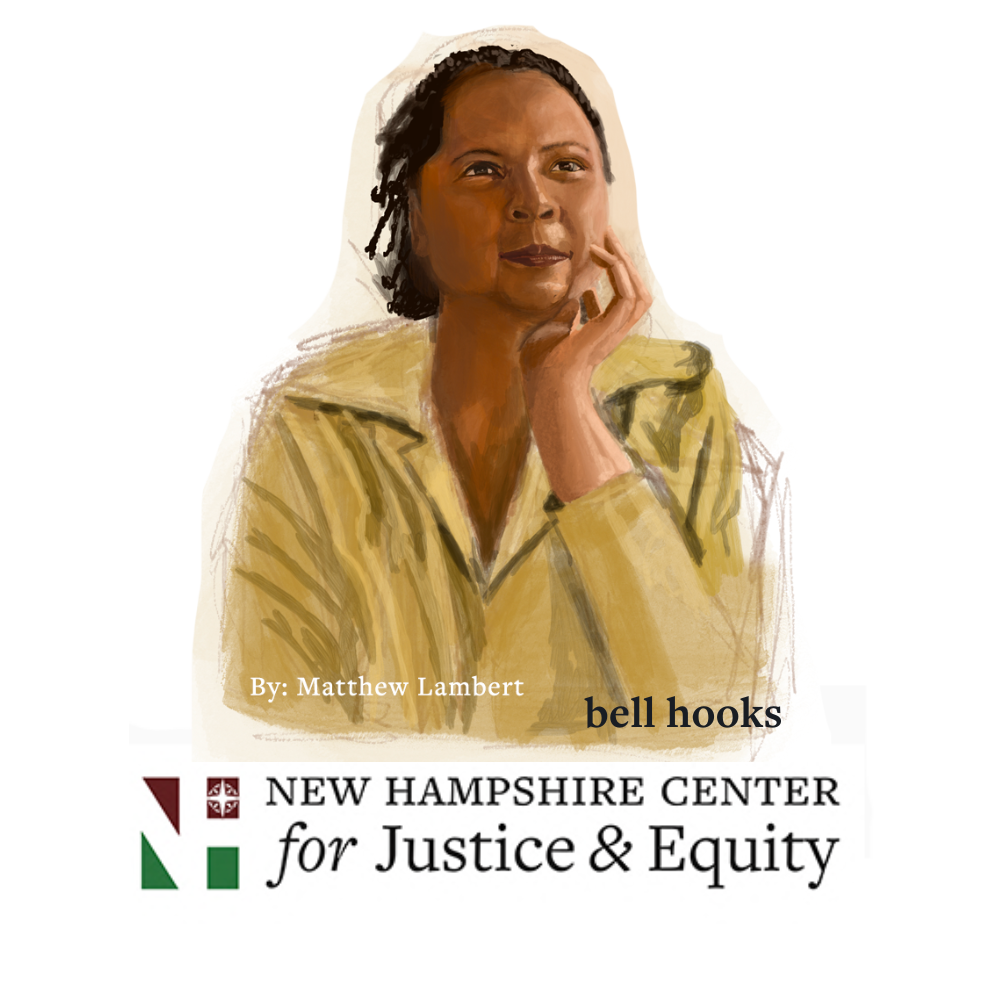bell hooks: A Voice for Love and Liberation
In our Icon Series, we give thanks to those whose lives have laid the foundation for our journey toward justice and equity. In this season of being focused on showing appreciation, the New Hampshire Center for Justice & Equity celebrates the extraordinary life of bell hooks.
Portrait of Bell Hooks. Image credits: The Bell Hooks Institute
About bell hooks
bell hooks was a trailblazing writer, feminist, and cultural critic whose work transformed how we think about race, gender, class, and love. She dedicated her life to making complex ideas about oppression accessible to everyone. Author of around 40 books, her award-winning work challenged systems of domination and called for a world rooted in care, community, and justice. As a teacher and theorist, she believed education should be a liberating act. Her legacy is a guiding light for equity, love, and social transformation.
Early Life and Becoming bell hooks
Born Gloria Jean Watkins on September 25, 1952, in the segregated town of Hopkinsville, Kentucky, bell hooks was the daughter of working-class parents. Her father was a janitor, and her mother a domestic worker.
As a child, hooks recited poetry from Gwendolyn Brooks, Langston Hughes, and Elizabeth Barrett Browning to her church community and began writing for her Sunday school magazine. At 19, she started writing what would become her first full-length book, Ain’t I a Woman: Black Women and Feminism, later published in 1981.
She adopted the pseudonym bell hooks, deliberately in lowercase, to honor her great-grandmother’s name and to draw attention toward her work rather than herself. After earning a B.A. from Stanford University in 1973, an M.A. from the University of Wisconsin–Madison, and a Ph.D. from the University of California, Santa Cruz in 1983, hooks worked as an educator, writer, and scholar.
Redefining Feminism Through Race, Class, and Gender
Through her essays, lectures, and books, hooks turned thinking into a form of activism. Her writing style was deliberately accessible to bridge the gap between scholars and the mass media, ensuring that her ideas could move beyond academic circles and reach those most affected by inequality.
In her most notable works, hooks criticized the white-centered feminist discourse by insisting that the experiences of Black women, economically marginalized people, and other social inequities should be taken into account. In Feminist Theory: From Margin to Center, published in 1984, she argued that sexism, racism, and class exploitation operate in interlocking systems, and that feminism must end oppression in all its forms. In 1989, Kimberlé Crenshaw would describe those interlocking forces of oppression as intersectionality.
hooks was also a strong believer in the power of sisterhood against oppression, and in the 1980s, she established a support group for Black women called the Sisters of the Yam, which was later used as the title of one of her books.
“What we do is more important than what we say or what we say we believe.”
Teaching to Transgress and Building Community
hooks taught at a variety of institutions, including English and ethnic studies at the University of Southern California, African and Afro-American studies at Yale University, women’s studies at Oberlin College, and English at the City College of New York. In 2004, she returned to Kentucky as a resident professor at Berea College, where the bell hooks Institute was founded in her honor in 2014.
At the core of hooks’ philosophy was a concept she called “engaged pedagogy”, a way of teaching that honors the whole person, connects with their experiences, and promotes freedom and love as transformative forces. She expanded this idea in her 1994 book Teaching to Transgress: Education as the Practice of Freedom.
Combining research with personal reflection, she described her experiences in segregated schools, where Black teachers nurtured academic excellence and political consciousness as ways to strengthen Black communities. For hooks, education was a joyful act of empowerment.
Love as a Radical Force for Cultural and Social Change
hooks also addressed themes like culture, media, and relationships in her work. In Black Looks: Race and Representation, published in 1992, she analyzed how Blackness is portrayed in media and why authentic representation matters. Her 2004 book We Real Cool: Black Men and Masculinity challenged dominant ideas of manhood and invited a reimagining of masculinity rooted in vulnerability and self-awareness.
In All About Love: New Visions, published in 1999, she proposed that love, grounded in care, respect, knowledge, and responsibility, is essential to dismantling systems of oppression and fostering collective healing.
Legacy and Lasting Influence
bell hooks died on December 15, 2021, at her home in Berea, Kentucky, at the age of 69. Over her lifetime, she created more than 70 published works, including essays, films, books, and children’s literature, making her one of the most influential feminist thinkers and cultural critics of her time.
hooks received numerous accolades for her work, including the American Book Award, the Lila Wallace–Reader’s Digest Writer’s Award, induction into the Kentucky Writers Hall of Fame, and, in 2020, she was recognized by Time magazine as one of the 100 Women of the Year.
In honoring bell hooks for NHCJE’s 2025 Icon Series, we celebrate a thinker and writer who believed in liberation for all people. Her legacy continues through the many students, activists, educators, and readers who have been shaped by her views on intersectional feminism and her insistence that love and justice are inseparable.
Learn more about bell hooks
https://nmaahc.si.edu/explore/stories/bell-hooks - National Museum of African American History & Culture
https://www.britannica.com/biography/bell-hooks - Britannica.com
https://www.poetryfoundation.org/poets/bell-hooks - Poetry Foundation
https://revisesociology.com/2025/03/20/bell-hooks-intersectionality-and-second-wave-feminism-challenging-white-patriarchy-and-capitalism/ - Revise Sociology
https://researchguides.uic.edu/bellhooks - University of Illinois Chicago
Call to Action
Following in the footsteps of the civil rights icons who came before us, New Hampshire is facing unprecedented challenges, and NHCJE is preparing to fight the ‘good fight’.
Will you help us continue their legacy by investing in our work this Giving Tuesday?



